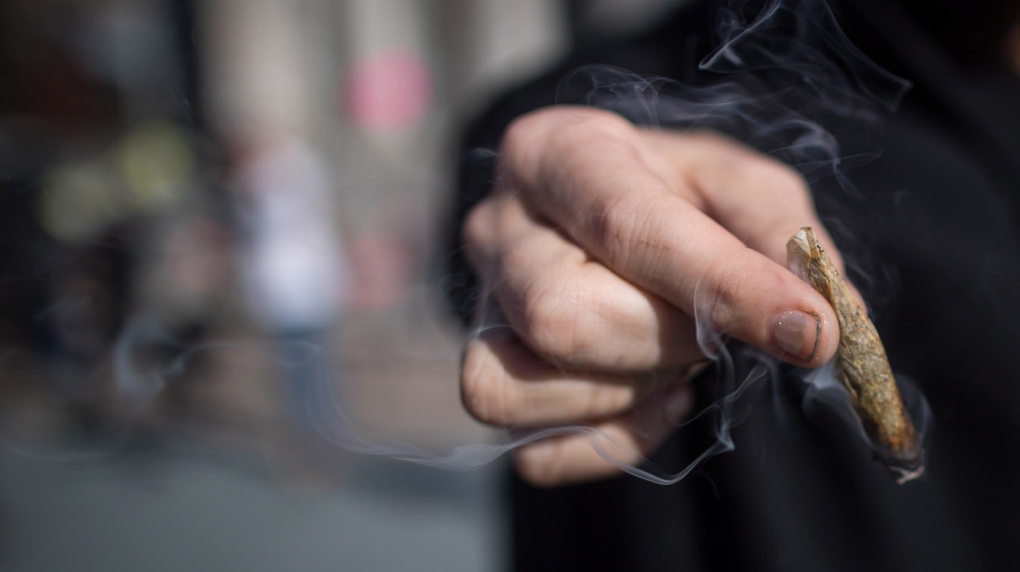Cannabis found in twice as many injured drivers since legalization: B.C. study
 A man holds a joint while smoking marijuana to celebrate the legalization of recreational cannabis, in Vancouver, on Wednesday October 17, 2018. (THE CANADIAN PRESS/Darryl Dyck)
A man holds a joint while smoking marijuana to celebrate the legalization of recreational cannabis, in Vancouver, on Wednesday October 17, 2018. (THE CANADIAN PRESS/Darryl Dyck)
A new study out of the University of British Columbia suggests that cannabis is being detected in twice as many injured drivers since its 2018 legalization.
Dr. Jeffrey Brubacher, an associate professor at UBC and the principal investigator of the study, says before cannabis was legalized, 3.8 per cent of injured drivers had THC concentrations above the Canadian legal driving limit of two nanograms/ml. That percentage rose to 8.6 per cent after cannabis was legalized.
The amount of injured drivers with a THC concentration of above five nanograms/ml in their system also went up, from 1.1 per cent pre-legalization to 3.5 per cent after legalization.
"It's concerning that we're seeing such a dramatic increase," Brubacher says in a news release. "There are serious risks associated with driving after cannabis use. Our findings suggests more is needed to deter this dangerous behaviour in light of legalization."
Brubacher and his colleagues analyzed blood samples from 4,339 "moderately injured" drivers who received treatment at four B.C. trauma centres between 2013 and 2020.
Researchers found that those over the age of 50 made up the largest increase of drivers injured while under the influence of cannabis.
The study, published in the New England Journal of Medicine, also suggests there weren't any significant changes in drivers testing positive for alcohol, on its own, or in combination with THC.
The federal government amended the Criminal Code when cannabis was legalized, which gave police more powers to test drivers who they suspected might be driving under the influence of drugs.
But Brubacher says the findings of the study show that it wasn't enough to deter cannabis impaired driving.
“We hope that policymakers will use our findings to design public information campaigns and enforcement measures that encourage drivers, especially older drivers, to separate cannabis use from driving. At the same time, it is important not to lose sight of alcohol impaired driving, which is extremely high risk, especially when combined with cannabis.”
The study suggests that while cannabis use is often associated with cognitive deficits, the presence of THC in the blood is not always an indicator that a collision was caused by cannabis impairment.
"Detecting cannabis, especially at low concentrations, doesn't necessarily mean a driver is impaired," Brubacher adds. "But the risk is real with higher THC levels, which is why it’s so important that we continue to assess and respond to the impact that legalization is having on road safety.”
Brubacher says his team is now expanding their research efforts to 15 trauma centres across Canada.
They plan to collect more information on the prevalence of cannabis, alcohol and other substances in injured drivers, which they hope could help guide traffic policies both nationally and provincially moving forward.
CTVNews.ca Top Stories

BREAKING Nine suspects arrested in $24M gold heist at Toronto Pearson International Airport: Peel police
Nine people have been arrested in connection with the gold heist at Pearson International Airport last year, Peel Regional Police said Wednesday.
Some of the winners and losers in the 2024 federal budget
With a variety of fiscal and policy measures announced in the federal budget, winners include small businesses and fintech companies while losers include the tobacco industry and Canadian pension funds.
Gas prices across Ontario expected to climb to levels not seen since 2022, analyst says
Ontario is going to see a big jump at the pumps later this week as gas prices in the province hit levels not seen in nearly two years, according to one industry analyst.
O.J. Simpson was chilling with a beer on a couch before Easter, lawyer says. 2 weeks later he was dead
O.J. Simpson's last robust discussion with his longtime lawyer was just before Easter, at the country club home Simpson leased southwest of the Las Vegas Strip. About a week later, on April 5, a doctor said Simpson was 'transitioning.'
Father of boy accused of stabbing 2 Australian clerics saw no signs of extremism, Muslim leader says
The father of a boy accused of stabbing two Christian clerics in Australia saw no signs of his son’s extremism, a Muslim community leader said on Wednesday as police began arresting suspected rioters who besieged a Sydney church demanding revenge.
500 Newfoundlanders wound up on the same cruise and it turned into a rocking kitchen party
A Celebrity Apex cruise to the Caribbean this month turned into a rocking Newfoundland kitchen party when hundreds of people from Canada's easternmost province happened to be booked on the same ship.
Liberals must now sell a budget they say will help younger Canadians catch up
It's now up to the federal Liberal government to sell a spending plan it says will help younger Canadians catch up to their elders.
Ontario woman out $30K after investing in mortgage company accused of being unlicensed
An Ontario nurse is fighting to recover tens of thousands of dollars in savings she invested in a mortgage company that has since been accused of operating without a licence.
Canada is expected to win 22 medals at the Paris Olympics
Canada is expected to win a total of 22 medals, including six gold, at the Paris Summer Olympics, which open on July 26.






























